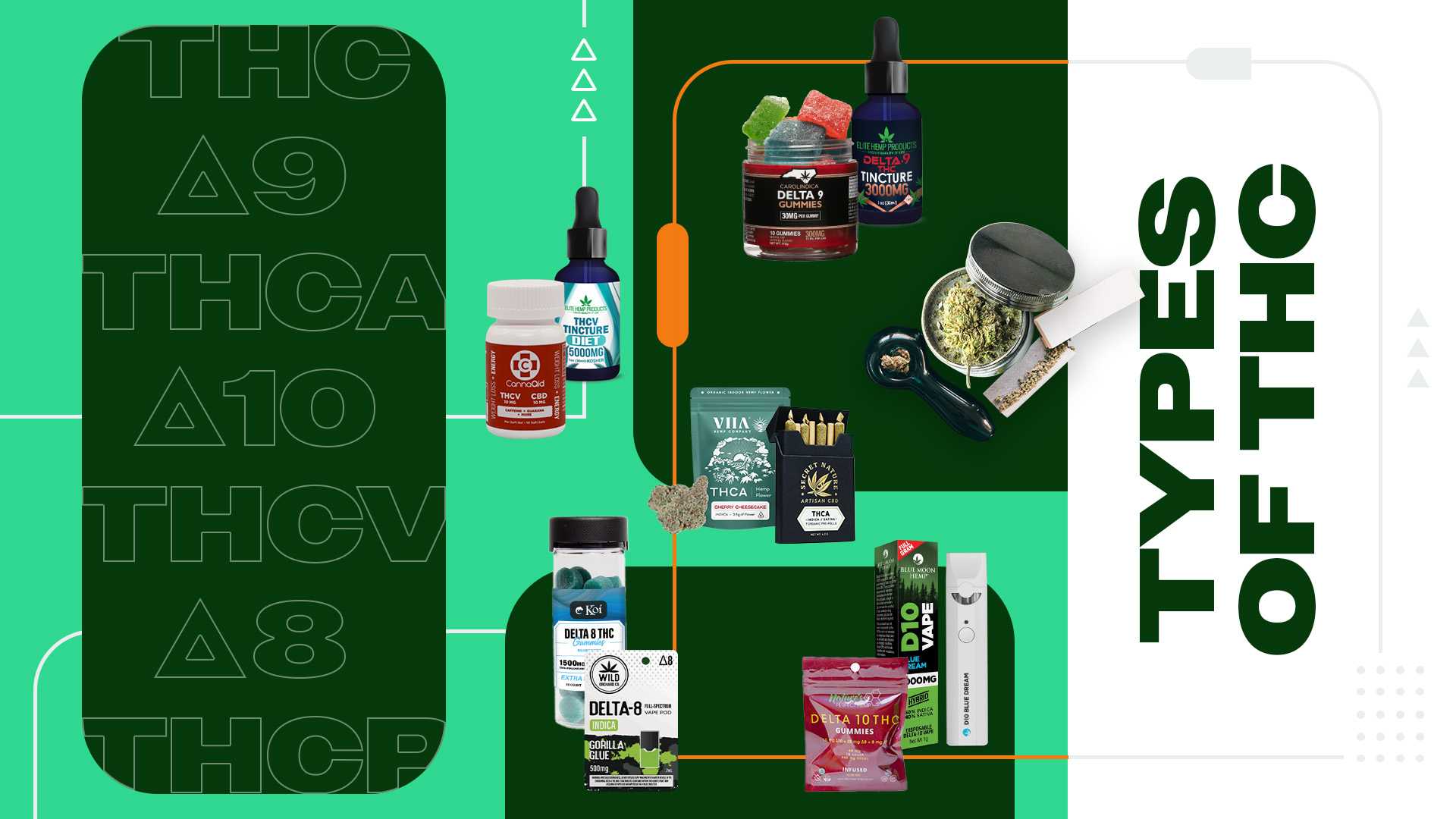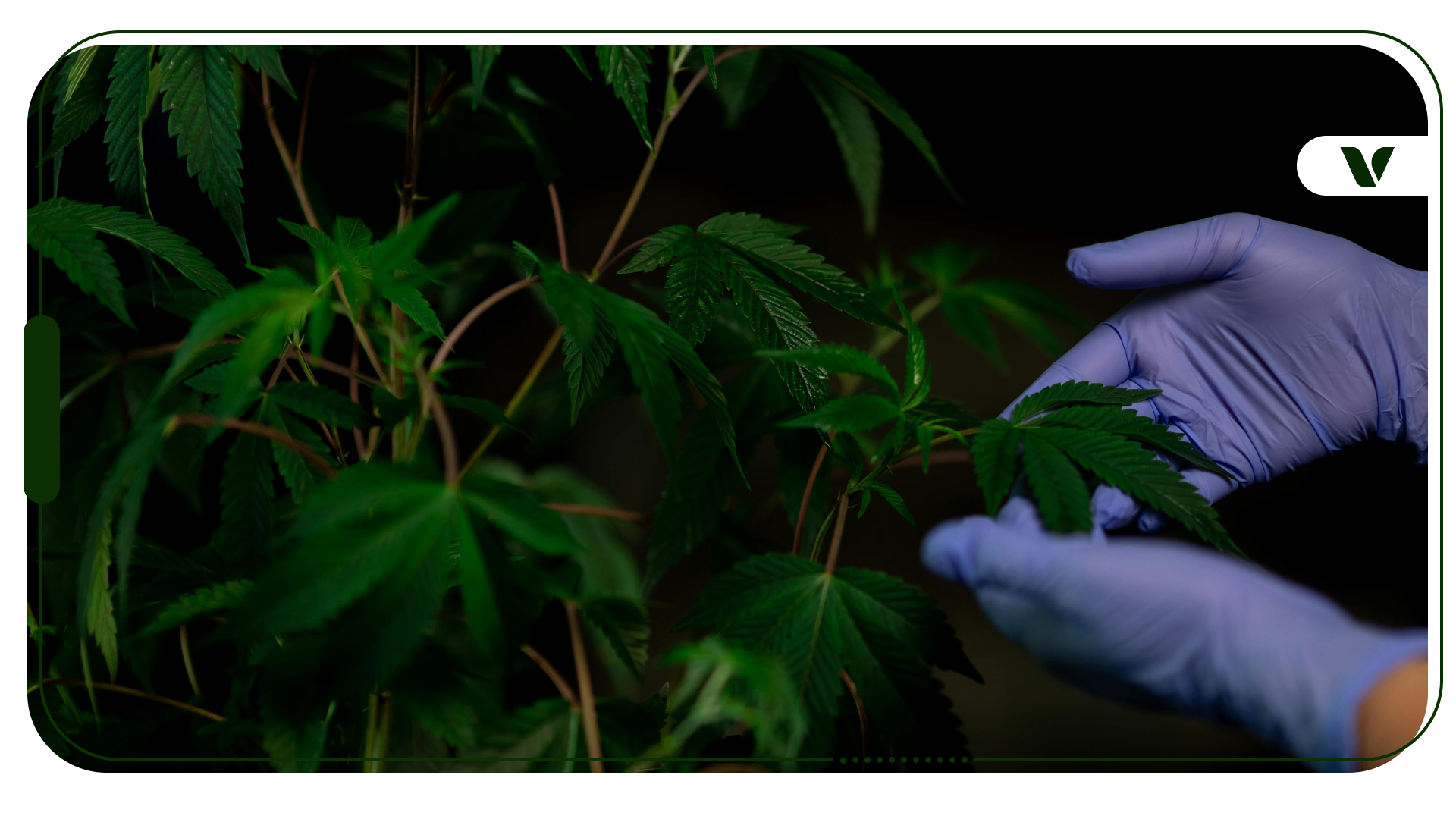New forms of THC are constantly being discovered and studied. But with so many cannabinoids at your disposal, how do you choose one that’s right for you?
This guide will help you understand the differences between various forms of THC, both recreationally and medicinally, by exploring the science and collective knowledge of the cannabis community.
Delta-9 THC
Delta-9 THC is the cannabinoid that people think of when they hear the term “THC.” It’s the most prevalent and clinically studied form of THC found in the cannabis plant.
It has many medicinal properties, including treating nausea and loss of appetite in patients undergoing chemotherapy, as well as (but not nearly limited to):
This cannabinoid binds to both CB1 and CB2 receptors in your endocannabinoid system, which helps regulate bodily functions including mood, appetite, sleep, pain levels, and more.
Delta-9 THC even goes beyond your cannabinoid receptors to work on many other receptor families that further help alleviate pain and inflammation common to many conditions. It can also improve mood and enhance recreational, social, or pleasurable, and spiritual experiences as it has for millennia.
Delta-8 THC
Delta-8 THC is probably, behind Delta-9, the second most popular form of THC. It is found naturally only in trace amounts in cannabis, so manufacturers produce Delta-8 from legal hemp CBD in order to meet mass retail demand.
It became federally legal thanks to the 2018 Farm Bill, which legalized all substances derived from hemp — defined as a plant containing less than 0.3% THC by dry weight. Cannabis and hemp are otherwise the same.
Delta-8 is, as the Journal of Cannabis Research puts it, “Delta-9’s nicer younger sibling.” This study cements that Delta-8 boomed in the market around 2020 thanks to its new-found, hemp-derived legality as a workaround for Delta-9’s prohibition.
Here are some people’s findings from the self-reporting study:
- 71% experienced relaxation
- 68% experienced euphoria
- 55% experienced pain relief
Likewise, Delta-8 is commonly favored due to its less intense side effects, with the study reporting that:
- 74% did not experience anxiety
- 83% did not experience paranoia
- 59% report substituting pharmaceutical drugs
- 57% report substituting Delta-9
Delta-8 is usually chosen due to prohibition or its more forgiving qualities compared to Delta-9. In fact, the only chemical difference between the two cannabinoids is the placement of one double bond. Because of the unique double bond placement, Delta-8 is estimated to have only 50 to 75% the psychotropic potency of Delta-9 THC.
Delta-10 THC
Delta-10 THC is an isomer of Delta-9, meaning the atoms are the same but the composition is not. In other words, the ingredients are basically identical, it’s just structurally rearranged.
The Delta-10 boom was largely successful because of the 2018 Farm Bill and how Delta-8 paved the way for the public to accept differing forms of THC. It isn’t as widely studied, so we’re a bit in the dark about its true therapeutic benefits or potential harms. Delta-10 is synthetically manufactured from hemp-derived CBD, and we don’t yet know what health hazards result from these methods of production.
Much like Delta-8, a Delta-10 high feels milder than what you’ll feel when consuming the same amount of Delta-9. Delta-10 most prominently induces a buzz and head high.
THCP
The scientific search for the potential of THCP is still in its infancy. In a groundbreaking 2019 discovery of THCP, researchers in this study from Scientific Reports state: “The presence of this new phytocannabinoid could account for the pharmacological properties of some cannabis varieties difficult to explain by the presence of the sole Δ9-THC.”
In other words, THCP may be the secret ingredient behind some effects of cannabis that can’t be explained by the presence of Delta-9 alone. Incredibly, THCP is 33% more active than Delta-9 THC at binding to CB1 and CB2 receptors in the body.
Why You Should Get Your Medical Marijuana Card
Veriheal has satisfied millions of patients nationwide by giving them access to these benefits
- Larger purchase limits
- Peace of mind
- Enhanced legal protection
- Access to higher potency strains
- Save up to 25% on cannabis purchases
- Skip the line at the dispensary
THCV
Unlike all the forms of THC we’ve talked about thus far, THCV lacks psychoactive effects.
The therapeutic benefits of THCV are being studied in rodents, and it’s showing promising results for potential diabetes management, including benefits such as:
- Decrease in appetite
- Increase in satiety
- Metabolism boost
But it doesn’t stop there. According to a 2020 study published in the Journal of Cannabis Research: “The uniquely diverse properties of THCV provide neuroprotection, appetite suppression, glycemic control, and reduced side effects, etc.; therefore, making it a potential priority candidate for the development of clinically useful therapies in the future. Hopefully, THCV could provide an optional platform for the treatment of life-threatening diseases.”
THCV is naturally occurring and similar to Delta-9 in molecular structure, although it interacts with the endocannabinoid system in different ways. It also acts on therapeutic targets outside the endocannabinoid system. Through these, THCV shares pain-relieving, antipsychotic, antiepileptic effects, and more. There are likely other targets, but we don’t exactly know which ones just yet.
THCO
THCO is a semisynthetic cannabinoid that was formerly hailed for its psychedelic effects, but that is starting to change. The Journal of Psychedelic Drugs published a research study of THCO users, in which they wrote: “When asked directly, 79% responded that using THC-O is ‘not at all’ or ‘a little’ of a psychedelic experience.”
More research is needed in order to make confident claims about the potential benefits and risks of consuming THCO products. Keep in mind that THC-O is not found in nature.
One claim that can be taken seriously is that vaping THC-O presents a potential risk for lung injury. Therefore, it may be best to avoid vaporized forms of THC-O until the research is better able to guide us.
What to Look For When Buying THC Products
The very first thing to look for when purchasing a THC product is a Certificate of Analysis (COA).
COA’s ensure third party testing is done and report back any presence of heavy metals, pesticides, or other contaminants that may be found in your THC product. It’s important to look at the COA closely to make sure no contaminants were found. If you can’t find a COA for your product, we don’t recommend purchasing it. This typically will be in a QR code on the side of the product or on the brand’s website.
COA’s are one of the few ways we have to regulate the safety of THC products, and without it, you have no idea what you may end up consuming due to an unregulated market.
If one exists, the COA should be relatively easy to find. Third-party testing costs money, and positive results are a huge selling point.
Final Thoughts
If you get anything out of this article, it should be to always look for a Certificate of Analysis when purchasing a THC product. This will ensure quality, safety, and make sure you have an unadulterated good time.
Additionally, lots of research is being done to try to catch up with the amount of products and cannabinoids being thrown on the market. But there’s quite a ways to go, with many studies currently limited to rodents or small, self-reporting sample sizes. Fortunately, more and more scientists are committing their careers to unlocking the benefits of cannabis and expanding knowledge for doctors and the public alike.
Always stay as informed as you can so that you can safely achieve the medicinal or recreational effects you’re looking for.
Frequently Asked Questions
What type of THC is good for sleep?
Delta-8 will likely prove the most effective for sleep due to its CBD derivation, potent but not overwhelming effects, and anti-anxiety properties.
What type of THC is in edibles?
Delta-9 is the most common form of THC and is the primary cannabinoid in edibles purchased at a dispensary.
Is Delta-8 or 9 stronger?
Delta-9 is considered the stronger of the two variants since Delta-8 is often derived from CBD.
How many types of THC are there?
Currently, scientists have discovered about 20 different types of THC. However, more may be discovered in the future as cannabis research and medicine improves.
Author, Share & Comments








